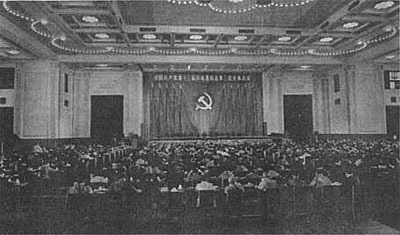|

The Third Plenary Session of the 13th Central Committee of the CPC was held September 26-30, 1988 (TANG MENGZONG)
The Third Plenary Session of the 13th Central Committee of the Communist Party of China (CPC) closed in Beijing on September 30. It concluded that the emphasis on reform and construction for the next two years is to put an end to confusion existing in economic activities, especially in the field of circulation.
The task calls for resolute and forceful measures, said a communique summing up the session.
The communique went on to point out that in order to fulfill the task, it is necessary to increase the supply of farm and sideline products, marketable light industrial and textile goods, and energy and raw materials.
"Price reforms will be conducted at a slower pace next year, and efforts must be made to ensure that next year's commodity price increase rates are lower than this year's. All work next year should serve this objective," the communique said.
The five-day session examined and adopted the report delivered by General Secretary Zhao Ziyang on behalf of the Political Bureau.
The plenary session held that the general economic situation in China is good at present but there also exist a number of difficulties and problems, with sharp price rises being the most prominent.
"Comprehensive reform should be carried out in a guided and orderly way with each aspect supplementing and promoting the others. Without a rational price structure, the establishment of a basis for a new economic system is out of the question. However, deepening the reform is not merely a matter of adjusting prices but involves comprehensive reforms in various fields, especially the reform of enterprises - large and medium-sized state-owned enterprises in particular."
The communique added that close attention should be paid to enterprise reform next year, in order to:
Separate government administration from enterprise management so that enterprises which meet certain conditions may operate on their own, and;
Further improve the contract responsibility system, make experiments in implementing the shareholding system with public ownership remaining predominant, and develop new enterprise groups on a trial basis.
"Economic efficiency will be raised by a mechanism set up to ensure that under macro-control by the state, the enterprises operate on their own, hold themselves responsible for their own profits and losses and constrain themselves," the communique said.
The plenary session said that the Party leadership should be strengthened to guarantee that economic reforms are implemented.
The session also called for strengthening democratic supervision and using law, administrative discipline and education to overcome corruption in the Party and government departments.
The communique affirmed that the past decade has witnessed achievements in reform, which have promoted economic and social progress. It added that now is the time to sum up experiences, to overcome difficulties and to continue the progress.
The plenary session called on the Party to unite and work together toward economization and achieving the objectives set forth by the session. This will result in greater reformations, a society more open to the world and in socialist modernization, according to the document.
The session approved in principle the "Preliminary Programme for Price and Wage Reforms" and proposed that the State Council organize efforts in the next five years or more to implement the programme. | 